Maybe you've decided to start carrying a gun for self-defense, or maybe you want a gun for home defense. Or perhaps you simply want to learn your way around firearms at the range or for hunting. Whatever the reason, it's time to choose your first handgun. Where do you start? Check out our guide on how to choose a handgun. It might be geared toward first-timers, but the information is good for all gun owners.
How To Choose a Handgun
When considering what handgun to buy, it can be helpful to first consider what you're going to use it for.
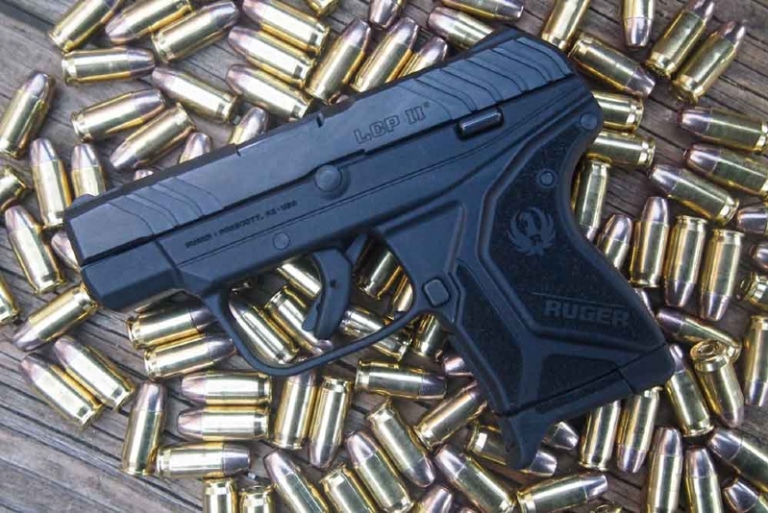
If you intend to use it for home defense, a full-sized handgun might be perfect, but if you want something highly concealable, you'll probably need to take a look at compact and sub-compact models. Firearms are purpose drive tools, so decide exactly what you're going to do with this gun and go from there.
What Brand of Handgun is the Best?
As a general rule, it's not entirely accurate to proclaim a specific firearm brand the best. That's because, aside from guns being tools that need to suit your needs, all gun owners have different sized hands, varying skill sets, and other features that make them all unique. Some guns come somewhat close to “one gun to rule them all” but there's no single perfect handgun for every shooter out there.
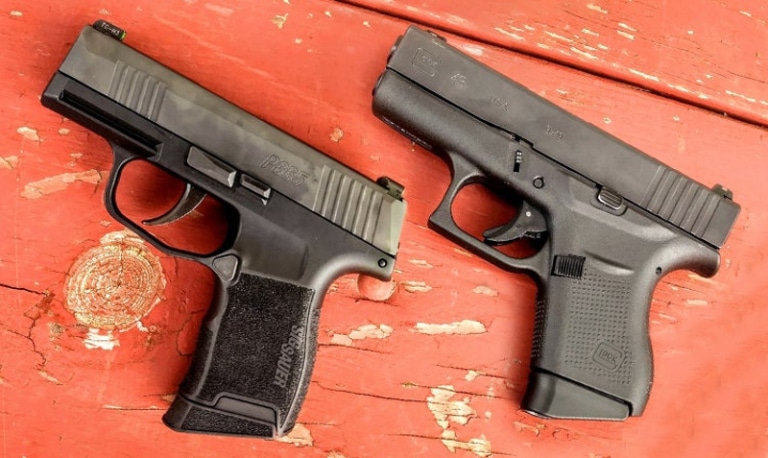
However, not all handguns are designed and produced with the same attention to detail and quality. Some brands to take more care with quality control and performance while others care only about making a cheaply priced pistol people will buy entirely because it's more affordable than others.
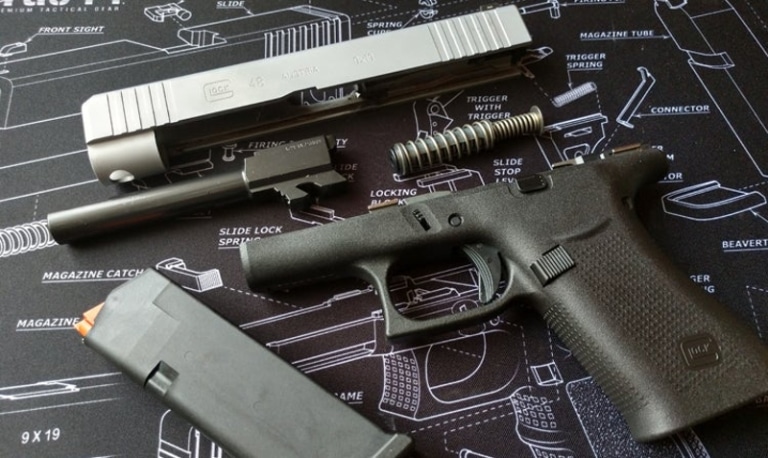
This is not a comprehensive list, but it's a place to start with brands that are worth considering for your first handgun purchase:
- Glock
- SIG Sauer
- Walther
- Mossberg
- Beretta
- Heckler and Koch
- Smith and Wesson
- FN USA
- Colt
- CZ USA
In addition to the manufacturers that produce numerous models and sizes of handguns, there are those that specialize in custom design, such as Cabot Guns, Nighthawk Custom, and Wilson Combat.
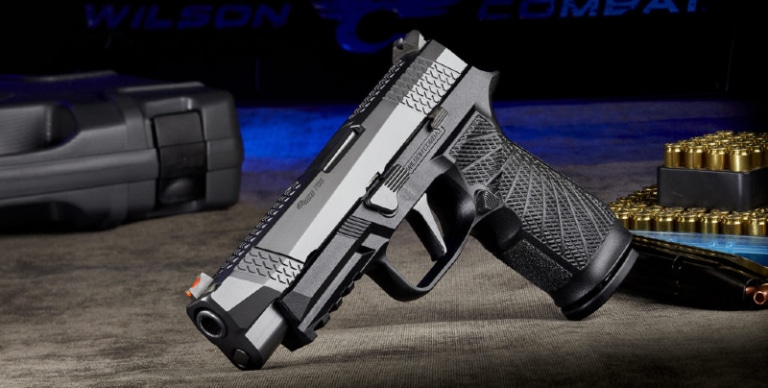
If you're not sure about a certain brand, do some digging. With a little time, you can usually get an idea of the quality and performance of a pistol. Always consider the source, remembering published reviews typically do not include a high round count and that social media comments often come from inexperienced shooters. Take it all with a grain of salt and decide what is best for you. Of course, if you notice a specific brand seems to have specific and repetitive negative things said about it, you'd be wise to pay attention.
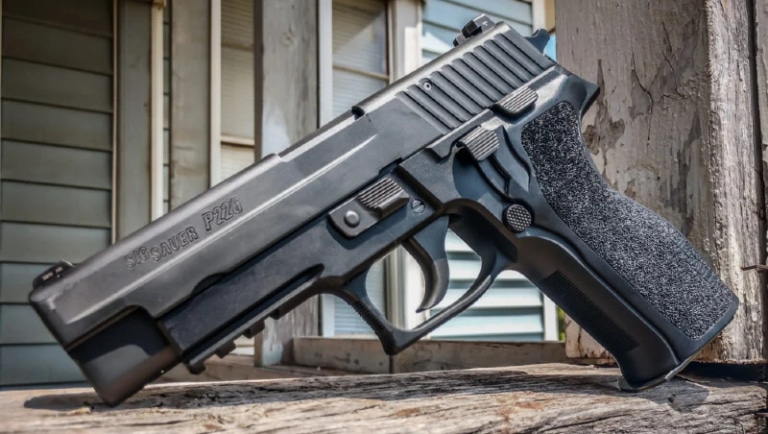
What Caliber Handgun is Best?
It might be redundant to say it again, but there is no “best” or “one size fits all” caliber. However, some are certainly better-suited to self-defense use than others.
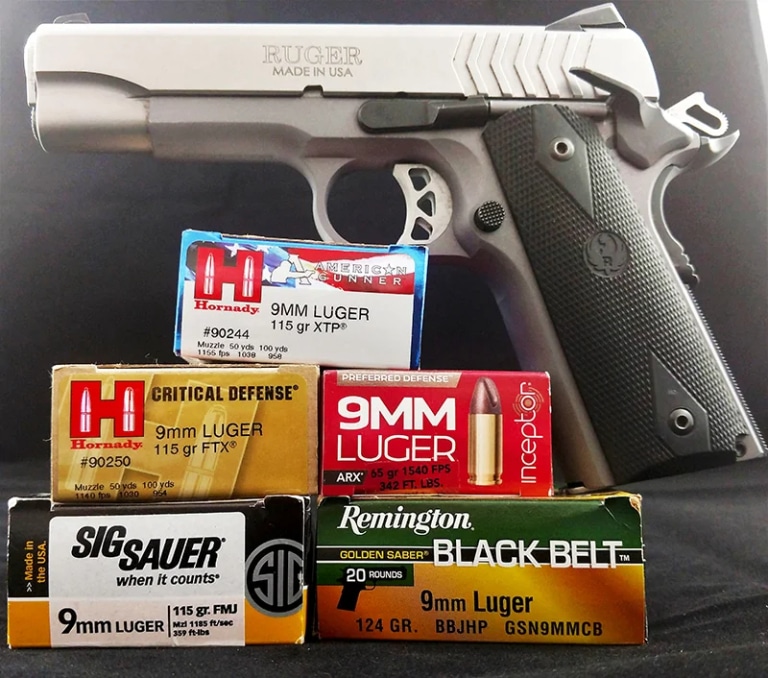
When choosing a first handgun, it's a good idea to seriously consider getting a gun chambered in 9x19mm Parabellum (9mm). Not only is it a proven, reliable caliber, it's widely available and there are a great deal of guns produced in 9mm. When it comes to a handgun meant for self-defense use, 9mm is a solid choice.
What Kind of Gun Should You Get?
There are a few different types of handguns—revolvers, striker-fired, hammer-fired, etc.—so it's normal to wonder what's ideal. The first thing you need to know is that the days when the guys at the gun store counter pushed revolvers should have ended long ago, but they haven't. Although there is nothing wrong with revolvers, aside from limited capacity, they tend not to be the best idea for a first gun.
Striker-fired handguns are popular for a reason. They're reliable, durable, and often priced at a level that won't destroy your bank account. Their overall operation tends to be straight-forward, too, and they have fewer moving parts than revolvers and 1911s. Glocks are striker-fired, as are Mossberg's handguns, among others. If the lack of an external thumb safety is what makes you not want a Glock to be your first handgun, don't worry; there are a lot of striker-fired handguns on the market that do have external safeties.
When deciding what type of action you want your first handgun to have, it helps to have hands-on experience. It's accurate that different actions have varying feels, from the triggers to their overall operation, and you might find you prefer one over another. Handguns can be rented to try out at some ranges and if that fails, ask friends if they'd be willing to take you to the range with their handguns. Tell them you'll cover the ammo and you'll be good to go.
What Size Handgun Should You Get?
The size of handgun you should get will depend on what you're using it for and your own hand size. Although it's true that compact and sub-compact handguns can be more easily concealed, it is possible to concealed carry a full-size handgun. However, if you have extremely large or small hands, you're going to find certain guns far more challenging to operate. That doesn't mean it'll be impossible, but it can and will hamper accuracy and comfort. Certain issues of fit can also make grip-related failures more likely to occur.
What Should You Look for in a Handgun?
There are a few specific features and capabilities you should demand of your handgun. In some instances, you have no choice but to use a certain gun until you can afford to invest in one that's a better fit for you, but when you can choose, consider the following:
Fit
When gripped in your strong side hand, the slide should align with the bones of your
forearm. If it's seriously canted off to one side, it's not a good fit.
Trigger reach
Can you place your finger on the trigger comfortably, or are your fingers too
short—or too long—for that particular gun? Could the trigger be replaced with an aftermarket
model that would correct the issue?
Caliber
All calibers are not created equally. Bluntly, there is a reason 9mm is used by law
enforcement, members of the military, and a lot of experienced gun owners. There's also a
reason cartridges like 380 ACP are popular, but not considered idea.
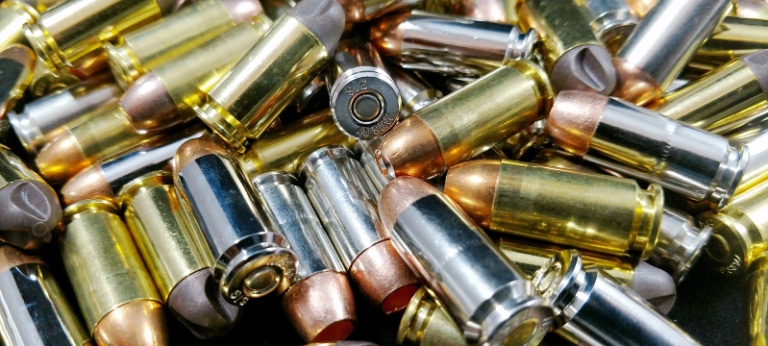
Choose a caliber that is proven as a defensive round and that produces felt recoil and muzzle rise you can control, or learn to control, fairly easily. Magnum guns are generally not the best choice for concealed carry.
Size
Take care not to buy a handgun that's too big for your body shape to conceal, and also be
sure not to buy a handgun that's so tiny you have trouble running it smoothly.
Reliability
As a general rule, it's wise to make sure your handgun of choice can cycle through
around 500 rounds of ammunition with no failures. At least 150 of those rounds should be
defensive loads, specially the loads you intend to carry. If the gun fails, the count starts all over.
Durability
Guns that are sensitive to be bumped on things, scraped, or otherwise heavily used
aren't ideal for defensive use. Your first handgun should be rough and tumble and able to stand
up to hard use.
Moving parts
Guns with fewer moving parts, such as Glocks, are typically cheaper and easier to
repair if something goes wrong.
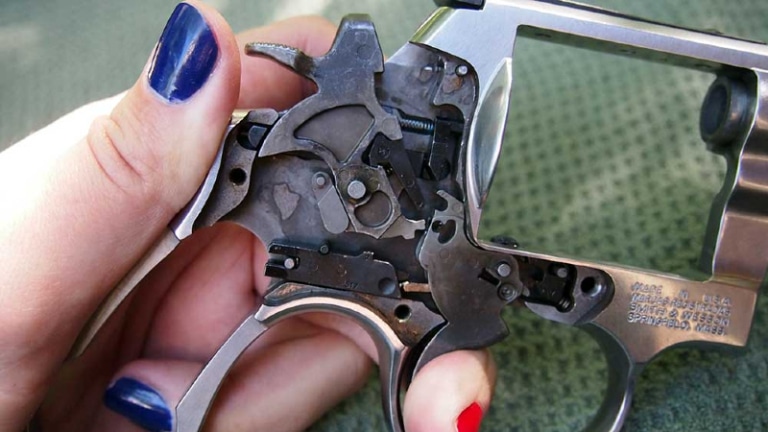
Aftermarket accessories
There are more aftermarket parts out there for popular guns like Glocks and SIGs. Consider the availability of accessories before committing to a brand.
Controls
Are the controls—thumb safety, magazine release, slide lock—easy to reach without
significantly adjusting your grip? They should be.
Capacity
Decide how much ammo you'd like your first handgun to hold. Remember to balance
that with the size and weight of the gun as it relates to whether or not you could easily
concealed carry it.
What Else Should You Know About Buying a Handgun?
A solid piece of advice for buying your first handgun is that it's usually smart to ignore the advice of the guy behind the gun counter. It's also wise not to consider what you read on social media to be gospel. That's not to say there aren't competent people working at gun stores, because there are, but only that they tend to be the exception rather than the rule. Basically, it pays to be cautious who you accept advice from. Never allow yourself to be forced or cajoled into buying a certain gun.
We have all had our first handguns, with mixed results. It's almost a rite of passage. Do your homework, test out as many handguns as possible, and make the best choice possible based on the information at hand. Then, hit the range. Get shooting and training time in. Experience will change your perspective of certain things, but that's a good thing. Learn from qualified instructors as you go, stick to it, and you'll be a seasoned shooter in no time.
Read the original article in its entirety at tacticalnewsonline.com.


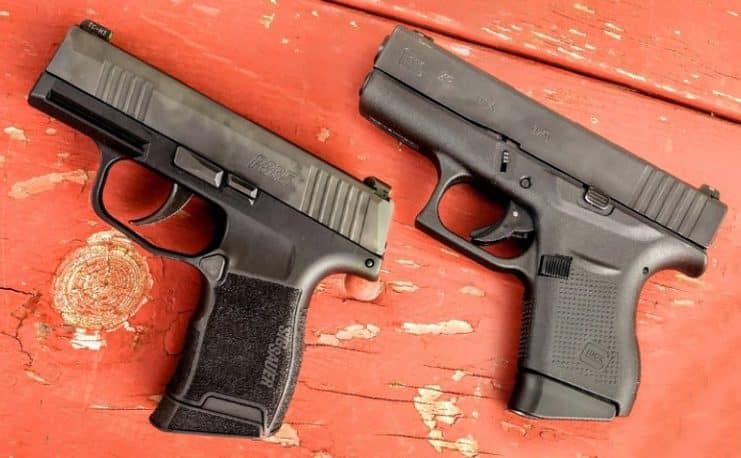
In 30 years of daily pistol carry and shooting often I can say that the 15 years with a revolver were without a single flaw mechanically. The rest of the semi autos I have used were also reliable utterly and most were Glocks but not all. My point is that concern about mechanical things are not as much to worry about as accidental discharges which almost always happen to semi auto users who are not as familiar as they maybe should be.